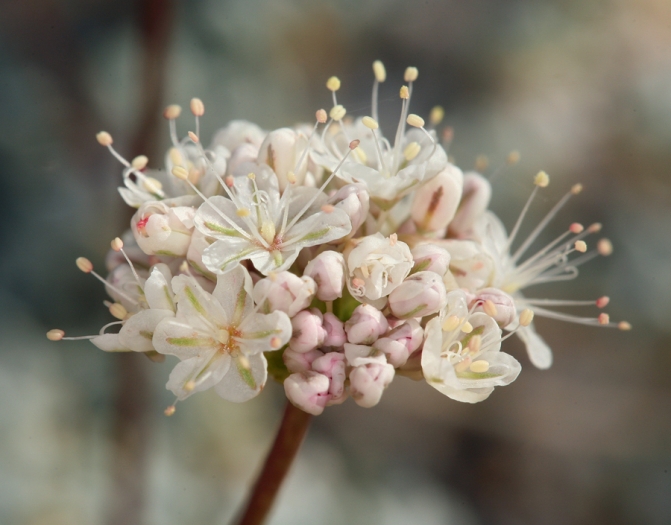Kennedy’s Buckwheat
(Eriogonum kennedyi)
Kennedy’s Buckwheat (Eriogonum kennedyi)
/
/

Steve Matson
CC BY 4.0
Image By:
Steve Matson
Recorded By:
Copyright:
CC BY 4.0
Copyright Notice:
Photo by: Steve Matson | License Type: CC BY 4.0 | License URL: http://creativecommons.org/licenses/by/4.0/ | Rights Holder: Steve Matson | Publisher: iNaturalist | Date Created: 2012-04-22T08:18:26-07:00 |























Estimated Native Range
Summary
Eriogonum kennedyi, commonly known as Kennedy’s buckwheat, is a perennial herb native to the chaparral, alpine, and subalpine habitats of California, specifically within the Transverse Ranges, Sierra Nevada foothills, and the high Sierra Nevada and western Great Basin. It typically forms small cushion-like mats up to 12 inches (30 cm) in diameter, with oval leaves that are densely coated in woolly fibers, providing a unique texture in the garden. The plant produces an erect scape that can reach up to 18 inches (45 cm) tall, bearing clusters of white to pink flowers with darker midribs, which bloom from late spring to early summer. The flowers are particularly showy and attract pollinators.
Kennedy’s buckwheat is valued for its drought tolerance and ability to thrive in poor, rocky soils, making it an excellent choice for rock gardens, xeriscaping, and restoration projects. It is also appreciated for its ornamental flowers and foliage, as well as its role as a food plant for specific butterfly species, including Bauer’s dotted blue and Ord Mountain metalmark. In cultivation, it requires minimal water once established, well-drained soils, and full sun to part shade. While generally low-maintenance, it can be susceptible to root rot if overwatered or planted in poorly drained soils. There are no major disease issues, but gardeners should be cautious of overwatering and ensure proper site selection with adequate drainage.CC BY-SA 4.0
Kennedy’s buckwheat is valued for its drought tolerance and ability to thrive in poor, rocky soils, making it an excellent choice for rock gardens, xeriscaping, and restoration projects. It is also appreciated for its ornamental flowers and foliage, as well as its role as a food plant for specific butterfly species, including Bauer’s dotted blue and Ord Mountain metalmark. In cultivation, it requires minimal water once established, well-drained soils, and full sun to part shade. While generally low-maintenance, it can be susceptible to root rot if overwatered or planted in poorly drained soils. There are no major disease issues, but gardeners should be cautious of overwatering and ensure proper site selection with adequate drainage.CC BY-SA 4.0
Plant Description
- Plant Type: Shrub, Herb
- Height: 0.5-1 feet
- Width: 1-2 feet
- Growth Rate: Moderate
- Flower Color: Pink, White
- Flowering Season: Summer, Fall
- Leaf Retention: Evergreen
Growth Requirements
- Sun: Full Sun
- Water: Low
- Drainage: Fast
Common Uses
Bee Garden, Butterfly Garden, Drought Tolerant, Low Maintenance, Rock Garden
Natural Habitat
Native to chaparral, alpine, and subalpine habitats of California
Other Names
Common Names: Kennedy’s Sulphur Flower
Scientific Names: , Eriogonum kennedyi, Eriogonum kennedyi, Eriogonum kennedyi subsp. kennedyi, Eriogonum kennedyi subsp. typicum,
GBIF Accepted Name: